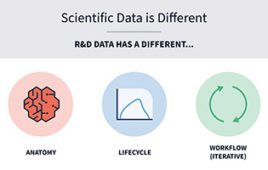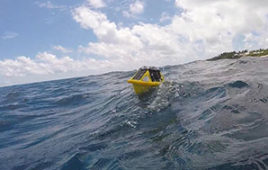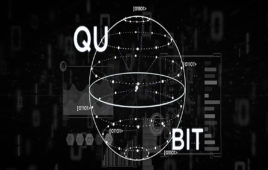 Associate Professor Julian Togelius works at the intersection of artificial intelligence (AI) and games — a largely unexplored juncture that he has shown can be the site of visionary and mind-expanding research. Could games provide a better AI test bed than robots, which — despite the way they excite public imagination — can be slow, unwieldy and expensive? According to him, the answer is resoundingly yes. Could an artificially intelligent operating system exhibit more originality than a human game designer? Togelius thinks so. “I’m teaching computers to be more creative than humans,” he says.
Associate Professor Julian Togelius works at the intersection of artificial intelligence (AI) and games — a largely unexplored juncture that he has shown can be the site of visionary and mind-expanding research. Could games provide a better AI test bed than robots, which — despite the way they excite public imagination — can be slow, unwieldy and expensive? According to him, the answer is resoundingly yes. Could an artificially intelligent operating system exhibit more originality than a human game designer? Togelius thinks so. “I’m teaching computers to be more creative than humans,” he says.
Togelius, a member of the NYU Tandon School of Engineering’s Department of Computer Science and Engineering, is at the forefront of the study of procedural content generation (PCG) — the process of creating game content (such as levels, maps, rules and environments) by employing algorithms, rather than direct user input. Specifically, he has pioneered the use of evolutionary algorithms for such tasks. (Evolutionary algorithms are inspired by biological functions like reproduction, mutation and natural selection.) These algorithms can work in tandem with other algorithms that recognize the player’s skill and preferences to change the game on the fly. But, in addition to creating customized games that contain virtually limitless levels to conquer, Togelius has shown that PCG can even generate entirely new games from scratch.
Togelius, thus, foresees game development becoming less costly (by speeding up the process and eliminating the need for human designers) and magnitudes more creative. People have a tendency to copy one another without even realizing it, as he tells the students in his undergraduate course AI for Games, and that’s a problem that could be avoided if human designers were taken out of the equation.
AI — machines or software that can think and act independently in a wide variety of situations — obviously has applicability far outside of gaming, but Togelius believes that games provide fair and reliable benchmarks for AI systems under development. He is widely known for inventing and running competitions based on digital action games — such as car racing and Super Mario Bros. — that allow developers to test how truly intelligent their AI is.
Such an approach has marked advantages over using robotics as an AI test bed, Togelius points out, explaining that as a doctoral candidate he had hoped to build robot software that would learn evolutionarily from its mistakes in order to develop increasingly complex and general intelligence. He soon realized, however, that in order for the robots to learn from their experiences, they would have to attempt each task thousands of times. This meant that even a simple experiment could take several days — and that was assuming that the robot didn’t break down (an unfortunately common occurrence) or behave in an inconsistent manner as its batteries depleted or motors warmed up.
A potential solution might have been to build an advanced robot with more sophisticated sensors and actuators and to develop complex environments in which it could learn; that proposition would be costly, however, and would present increased chances for malfunction.
“This all adds up, and quickly becomes unmanageable,” he says. “I was too ambitious and impatient for that. I wanted to create complex intelligence that could learn from experience. So, I turned to video games.”
Professor Andy Nealen, who co-directs Tandon’s Game Innovation Lab, stresses the far-ranging implications of that change in approach. “Togelius’s work is now leading to algorithms capable of better-than-human decision making — a result with implications for games and beyond,” he says.
Togelius, who mentors several BS/MS students at the Game Innovation Lab, is providing ample proof that games are among the most relevant and important domains for anyone hoping to work seriously with AI.




